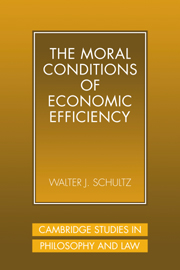The Moral Conditions of Economic Efficiency
$43.99 (C)
Part of Cambridge Studies in Philosophy and Law
- Author: Walter J. Schultz, Cedarville University, Ohio
- Date Published: January 2008
- availability: Available
- format: Paperback
- isbn: 9780521048279
$
43.99
(C)
Paperback
Other available formats:
Hardback, eBook
Looking for an examination copy?
If you are interested in the title for your course we can consider offering an examination copy. To register your interest please contact [email protected] providing details of the course you are teaching.
-
Walter J. Schultz illustrates the deficiencies of theories that purport to show that markets alone can provide the basis for efficiency. He argues that markets are not moral-free zones, and that achieving the economic common good does indeed require morality. He demonstrates that efficient outcomes of market interaction cannot be achieved without moral normative constraints and then goes on to specify a set of normative conditions that make these positive outcomes possible.
Read more- Schultz rigorously proves that Adam Smith's ideas regarding the relationship between morality and markets are mistaken
- Schultz shows that achieving and sustaining an economically efficient economy requires a moral right to welfare
- The book transcends interminable ethical debates regarding markets and morality by its reliance on an account of morality as a social practice
Customer reviews
Not yet reviewed
Be the first to review
Review was not posted due to profanity
×Product details
- Date Published: January 2008
- format: Paperback
- isbn: 9780521048279
- length: 160 pages
- dimensions: 228 x 153 x 9 mm
- weight: 0.247kg
- availability: Available
Table of Contents
Preface and acknowledgements
1. Introduction and synopsis
2. A contextualized proof of the first fundamental theorem of welfare economics
3. The moral thesis: moral normative constraints are necessary conditions of pareto-optimal equilibrium allocations of commodities achieved through market interaction
4. A spontaneous order objection
5. The roles of normative constraints in relation to externalities
6. The moral conditions of economic efficiency
7. Implications
Notes
Bibliography
Index.
Sorry, this resource is locked
Please register or sign in to request access. If you are having problems accessing these resources please email [email protected]
Register Sign in» Proceed
You are now leaving the Cambridge University Press website. Your eBook purchase and download will be completed by our partner www.ebooks.com. Please see the permission section of the www.ebooks.com catalogue page for details of the print & copy limits on our eBooks.
Continue ×Are you sure you want to delete your account?
This cannot be undone.
Thank you for your feedback which will help us improve our service.
If you requested a response, we will make sure to get back to you shortly.
×














